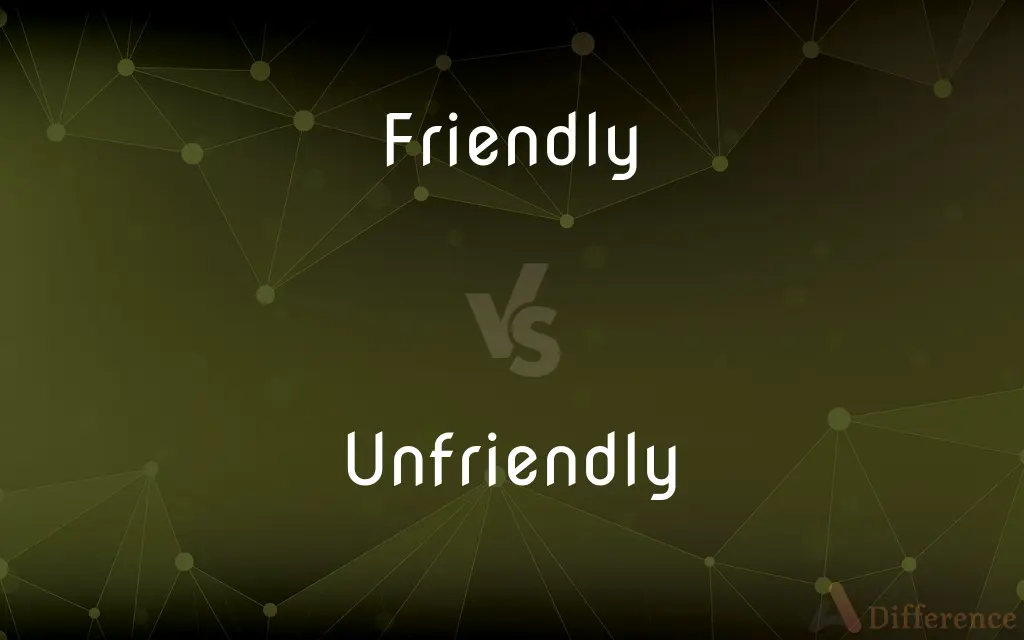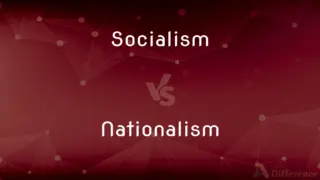Friendly vs. Unfriendly — What's the Difference?
Edited by Tayyaba Rehman — By Maham Liaqat — Updated on April 20, 2024
Friendly people display warmth and approachability, often engaging positively with others, while unfriendly individuals may seem distant or aloof, showing little interest in social interactions.

Difference Between Friendly and Unfriendly
Table of Contents
ADVERTISEMENT
Key Differences
Friendly individuals are characterized by their openness and willingness to engage in conversation. They typically exhibit welcoming body language, such as smiling, making eye contact, and open gestures. Whereas, unfriendly people might avoid eye contact, rarely smile, and maintain closed body posture, making them seem less accessible.
Being friendly often involves showing genuine interest in others' lives, asking questions, and actively listening, which helps in building rapport and fostering relationships. On the other hand, unfriendly behavior can manifest as a lack of interest or disregard for others' thoughts or feelings, often resulting in minimal interaction or engagement.
In social or work environments, friendly people are usually seen as cooperative and collaborative, eager to participate and assist others. In contrast, those who are unfriendly may be perceived as uncooperative or indifferent, potentially hindering teamwork or group dynamics.
Friendly behavior can influence one’s social network positively, often leading to more connections and a supportive community. Unfriendly individuals, however, might find themselves isolated or with fewer social interactions, which can impact their personal and professional lives.
The impact of being friendly or unfriendly also extends to first impressions. Friendly people are generally more likable and approachable, making positive impressions more likely. Conversely, unfriendly individuals might be viewed as cold or unapproachable, which could affect how others perceive and interact with them.
ADVERTISEMENT
Comparison Chart
Body Language
Open, smiling, eye contact
Closed, no smile, avoids eye contact
Social Interaction
Engaging, interested
Distant, disinterested
Impact on Others
Positive, approachable
Negative, unapproachable
Typical Behavior
Cooperative, collaborative
Indifferent, uncooperative
Social Network
Larger, supportive
Smaller, less supportive
Compare with Definitions
Friendly
Showing warmth and openness towards others.
He greeted everyone with a friendly smile.
Unfriendly
Showing little interest in interacting with others.
Her unfriendly reply discouraged further conversation.
Friendly
Engaging in behaviors that promote positive interactions.
Her friendly attitude made her popular at work.
Unfriendly
Unlikely to engage in cooperative behaviors.
His unfriendly attitude made collaboration difficult.
Friendly
Characterized by kindness and approachability.
They received the new student with friendly enthusiasm.
Unfriendly
Often distant or aloof in social settings.
His unfriendly demeanor kept his colleagues at arm’s length.
Friendly
Likely to support and help others.
He’s always friendly and ready to lend a hand.
Unfriendly
May seem cold or indifferent.
The unfriendly reception at the new office was unsettling.
Friendly
Positive impact on social connections.
Her friendly nature attracts many friends.
Unfriendly
Negative impact on social relationships.
Her unfriendly approach resulted in a lack of friends.
Friendly
Kind and pleasant
She gave me a friendly smile
They were friendly to me
Unfriendly
Not friendly.
Friendly
Denoting something that is adapted for or is not harmful to a specified thing
Child-friendly policies
An environment-friendly agronomic practice
Unfriendly
Antagonistic or hostile
An unfriendly nation.
Friendly
Favourable or serviceable
No one noticed her as she slipped out—it was a friendly night
Unfriendly
User-unfriendly.
Friendly
(of troops or equipment) of, belonging to, or allied with one's own forces
The risk of blowing up friendly forces is minimized
Unfriendly
Not friendly; hostile; mean.
Friendly
A game or match that does not form part of a serious competition
England will play two friendlies in Sardinia
Unfriendly
Unfavourable.
Friendly
Characteristic of or behaving as a friend
A friendly greeting.
Is friendly with his neighbors.
Unfriendly
An enemy.
Friendly
Outgoing and pleasant in social relations
A friendly clerk.
Unfriendly
In an unkind or unfriendly manner; not as a friend
Friendly
Favorably disposed; not antagonistic
A government friendly to our interests.
Unfriendly
Not friendly; not kind or benevolent; hostile; as, an unfriendly neighbor.
Friendly
User-friendly.
Unfriendly
Not favorable; not adapted to promote or support any object; as, weather unfriendly to health.
Friendly
(Informal) Easy to understand or use for a specified agent. Often used in combination
A reader-friendly novel.
A consumer-friendly policy.
Unfriendly
Not easy to understand or use;
User-unfriendly
Friendly
(Informal) Low in amount relative to a standard or regular circumstance. Often used in combination
Carbohydrate-friendly.
Unfriendly
Not disposed to friendship or friendliness;
An unfriendly coldness of manner
An unfriendly action to take
Friendly
In the manner of a friend; amicably.
Unfriendly
Lacking warmth of feeling;
A chilly greeting
An unfriendly manner
Friendly
One fighting on or favorable to one's own side
"You're the only friendly we have there right now" (Tom Clancy).
Unfriendly
Not friendly;
An unfriendly act of aggression
An inimical critic
Friendly
Generally warm, approachable and easy to relate with in character.
Your cat seems very friendly.
Unfriendly
Very unfavorable to life or growth;
A hostile climate
An uncongenial atmosphere
An uncongenial soil
The unfriendly environment at high altitudes
Friendly
Inviting, characteristic of friendliness.
He gave a friendly smile.
Friendly
Having an easy or accepting relationship with something.
A user-friendly software program
A dog-friendly café
The use of environmentally friendly packaging
Friendly
(in compounds) Compatible with, or not damaging to (the compounded noun).
The cobbled streets aren't very bike-friendly.
Organic farms only use soil-friendly fertilisers.
Our sandwiches are made with dolphin-friendly tuna.
Friendly
Without any hostility.
A friendly competition
A friendly power or state
Friendly
Promoting the good of any person; favourable; propitious.
A friendly breeze or gale
Friendly
Of or pertaining to friendlies (friendly noun sense 2, below). Also applied to other bipolar confrontations, such as team sports.
The soldier was killed by friendly fire.
Friendly
(number theory) Being or relating to two or more natural numbers with a common abundancy.
Friendly pairs
Friendly n-tuples
Friendly
(sports) A game which is of no consequence in terms of ranking, betting etc.
This match is merely a friendly, so don't worry too much about it.
Friendly
A person or entity on the same side in a conflict.
Friendly
(archaic) In a friendly manner, like a friend.
Friendly
Having the temper and disposition of a friend; disposed to promote the good of another; kind; favorable.
Friendly
Appropriate to, or implying, friendship; befitting friends; amicable.
In friendly relations with his moderate opponents.
Friendly
Not hostile; as, a friendly power or state.
Friendly
Promoting the good of any person; favorable; propitious; serviceable; as, a friendly breeze or gale.
On the first friendly bank he throws him down.
Friendly
In the manner of friends; amicably; like friends.
In whom all graces that can perfect beautyAre friendly met.
Friendly
A friendly person; - usually applied to natives friendly to foreign settlers or invaders.
These were speedily routed by the friendlies, who attacked the small force before them in fine style.
Friendly
A member of one's own military forces, or of allied forces.
Friendly
Characteristic of or befitting a friend;
Friendly advice
A friendly neighborhood
The only friendly person here
A friendly host and hostess
Friendly
Favorably disposed; not antagonistic or hostile;
A government friendly to our interests
An amicable agreement
Friendly
Easy to understand or use;
User-friendly computers
A consumer-friendly policy
A reader-friendly novel
Friendly
Of or belonging to your own country's forces or those of an ally;
In friendly territory
He was accidentally killed by friendly fire
Common Curiosities
What makes someone appear friendly?
A friendly person often smiles, maintains eye contact, and shows open body language.
Does culture affect perceptions of friendliness?
Yes, cultural backgrounds can influence what behaviors are considered friendly or unfriendly.
Can someone be unfriendly without intending to?
Yes, sometimes people may appear unfriendly due to shyness or personal issues, not necessarily an intention to be distant.
How can friendliness affect work environment?
Friendliness can improve collaboration and morale, making the work environment more positive and productive.
How do friendly people handle conflicts?
Friendly people typically handle conflicts by seeking understanding and compromise, aiming to maintain positive relationships.
What are some examples of friendly gestures?
Examples include waving hello, offering a handshake, or inviting someone to join a group.
What are the potential consequences of unfriendly behavior?
Unfriendly behavior can lead to misunderstandings, social isolation, and negative perceptions.
Is it possible to change from unfriendly to friendly?
Yes, with awareness and effort, individuals can adopt more open and engaging behaviors, becoming more friendly over time.
Why might someone choose to be unfriendly?
Personal preferences, past experiences, or a desire for privacy can lead someone to behave unfriendly.
Can being too friendly be a problem?
Excessive friendliness might sometimes be perceived as insincere or intrusive, depending on the context.
How does friendliness influence leadership?
Friendly leaders are often more approachable and trusted, which can enhance their effectiveness.
Share Your Discovery

Previous Comparison
Socialism vs. Nationalism
Next Comparison
Concede vs. AccedeAuthor Spotlight
Written by
Maham LiaqatEdited by
Tayyaba RehmanTayyaba Rehman is a distinguished writer, currently serving as a primary contributor to askdifference.com. As a researcher in semantics and etymology, Tayyaba's passion for the complexity of languages and their distinctions has found a perfect home on the platform. Tayyaba delves into the intricacies of language, distinguishing between commonly confused words and phrases, thereby providing clarity for readers worldwide.
















































